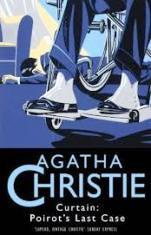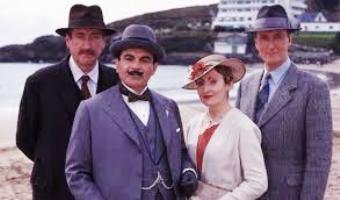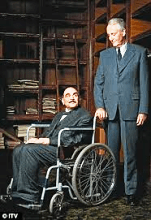Thomas Ovans glances back at the ITV series of Poirot adventures which recently came to an end


.
Curtain, the final episode in the complete series of Hercule Poirot stories was screened by ITV on November 13, 2013. One of my first reactions was to wonder why so significant an event was not saved as a Christmas offering. Perhaps it was timed so that the DVD could be on sale a full month before December 25th?
A more generous response, however, would be for me to admit I have had a lot of pleasure from the Poirot series. I have however generally preferred the earlier one-hour pieces (which continue to be repeated on ITV3). David Suchet’s brilliant characterization of Poirot was still very fresh; and the initial supporting cast of Captain Hastings (Hugh Fraser), Inspector Japp (Philip Jackson) & Miss Lemon (Pauline Moran) helped the productions to achieve an appropriate tongue-in-cheek tone. The glimpses of art deco buildings and interiors were enjoyable too.
 The later, more lavishly produced, two-hour episodes have come close to over-stretching Agatha Christie’s plots and characterization. The later stages of these longer dramas have sometimes amounted to little more than a deferral of gratification as the set-piece dénouement in the drawing room (or library, or conservatory) is delayed for no compelling reason.
The later, more lavishly produced, two-hour episodes have come close to over-stretching Agatha Christie’s plots and characterization. The later stages of these longer dramas have sometimes amounted to little more than a deferral of gratification as the set-piece dénouement in the drawing room (or library, or conservatory) is delayed for no compelling reason.
Curtain was a darker piece than many of its predecessors and seemed to take itself much more seriously. The sight of Poirot as an invalid in a wheelchair brought a genuine sense of mortality – something rarely present in murder mystery stories. But, as with some previous two-hour episodes, the drama moved too slowly and lost my attention from time to time. Hence I never quite understood why such a diverse collection of characters had assembled so conveniently at Styles – the scene of Poirot’s first case. Nor did I see why the villain became so agitated when eventually accused, since much had been made of the fact that this person’s guilt could not actually be proved. It has to be recognized, I suppose, that motivation does not usually matter much in any Christie story. The plots hinge chiefly in the misdirection, the apparent alibi and the opportunistically seized coincidences. But I would question whether the plot of Curtain even keeps within the particular rules of detective fiction since it depends on us being deliberately misled by a source that would normally be assumed to be reliable.
David Suchet’s portrayal of Poirot has of course been a fine and sustained piece of TV acting. He has been deservedly praised and his distinctive mannerisms widely discussed. (Indeed we have lately been given a little too much technical information regarding the placement of small coins.) He mixed Poirot’s self-importance with a charm that would probably have overcome Agatha Christie’s reputed dislike of her own creation. The length of the series means that Suchet has been able to let nature help him to make his character grow older. Of course Suchet has by no means reached Poirot’s “actual” age which, on the basis of internal evidence in the books, has, I believe, been estimated to be about 120!

It was good to see Captain Hastings again in Curtain. Although lately bereaved, he seemed to have worn rather better than Poirot himself. Hugh Fraser’s contribution over some forty episodes has probably been undervalued and he has always done a good job (often wordlessly) of representing the audience in being alternately baffled and amazed. He has also done well at registering disapproval of unBritish lack of fair play. In Curtain he is goaded well beyond his comfort zone by his daughter’s involvement with a womaniser. This leads him to become part of the plot as well as part of the solution. Hastings also has to endure some very sharp criticism from a Poirot who has become a good deal more irritable in his declining years. Being called cher ami from time to time seems poor compensation. A more tangible consolation for Hastings the widower is hinted at in a final scene with Elizabeth Cole (Helen Baxendale) whose main contribution until then has been some mournful and rather heavy-handed piano playing.
The ending of the Poirot series is surely an event of significance for the programme makers and the actors. The job is done. The canon is complete (unless ‘new’ adventures are one day provided for Hercule – as has been done for Sherlock Holmes.) But the re-runs will presumably continue and the boxed sets will certainly be available. Hence, for audiences, there seems to be no end in sight to the particular kind of comfort-viewing provided by Christie’s golden-age detective stories. And I can go on hoping that I will come across an ITV3 repeat that I haven’t previously seen …
Thomas Ovans glances back at the ITV series of Poirot adventures which recently came to an end
.
Curtain, the final episode in the complete series of Hercule Poirot stories was screened by ITV on November 13, 2013. One of my first reactions was to wonder why so significant an event was not saved as a Christmas offering. Perhaps it was timed so that the DVD could be on sale a full month before December 25th?
A more generous response, however, would be for me to admit I have had a lot of pleasure from the Poirot series. I have however generally preferred the earlier one-hour pieces (which continue to be repeated on ITV3). David Suchet’s brilliant characterization of Poirot was still very fresh; and the initial supporting cast of Captain Hastings (Hugh Fraser), Inspector Japp (Philip Jackson) & Miss Lemon (Pauline Moran) helped the productions to achieve an appropriate tongue-in-cheek tone. The glimpses of art deco buildings and interiors were enjoyable too.
Curtain was a darker piece than many of its predecessors and seemed to take itself much more seriously. The sight of Poirot as an invalid in a wheelchair brought a genuine sense of mortality – something rarely present in murder mystery stories. But, as with some previous two-hour episodes, the drama moved too slowly and lost my attention from time to time. Hence I never quite understood why such a diverse collection of characters had assembled so conveniently at Styles – the scene of Poirot’s first case. Nor did I see why the villain became so agitated when eventually accused, since much had been made of the fact that this person’s guilt could not actually be proved. It has to be recognized, I suppose, that motivation does not usually matter much in any Christie story. The plots hinge chiefly in the misdirection, the apparent alibi and the opportunistically seized coincidences. But I would question whether the plot of Curtain even keeps within the particular rules of detective fiction since it depends on us being deliberately misled by a source that would normally be assumed to be reliable.
David Suchet’s portrayal of Poirot has of course been a fine and sustained piece of TV acting. He has been deservedly praised and his distinctive mannerisms widely discussed. (Indeed we have lately been given a little too much technical information regarding the placement of small coins.) He mixed Poirot’s self-importance with a charm that would probably have overcome Agatha Christie’s reputed dislike of her own creation. The length of the series means that Suchet has been able to let nature help him to make his character grow older. Of course Suchet has by no means reached Poirot’s “actual” age which, on the basis of internal evidence in the books, has, I believe, been estimated to be about 120!
It was good to see Captain Hastings again in Curtain. Although lately bereaved, he seemed to have worn rather better than Poirot himself. Hugh Fraser’s contribution over some forty episodes has probably been undervalued and he has always done a good job (often wordlessly) of representing the audience in being alternately baffled and amazed. He has also done well at registering disapproval of unBritish lack of fair play. In Curtain he is goaded well beyond his comfort zone by his daughter’s involvement with a womaniser. This leads him to become part of the plot as well as part of the solution. Hastings also has to endure some very sharp criticism from a Poirot who has become a good deal more irritable in his declining years. Being called cher ami from time to time seems poor compensation. A more tangible consolation for Hastings the widower is hinted at in a final scene with Elizabeth Cole (Helen Baxendale) whose main contribution until then has been some mournful and rather heavy-handed piano playing.
The ending of the Poirot series is surely an event of significance for the programme makers and the actors. The job is done. The canon is complete (unless ‘new’ adventures are one day provided for Hercule – as has been done for Sherlock Holmes.) But the re-runs will presumably continue and the boxed sets will certainly be available. Hence, for audiences, there seems to be no end in sight to the particular kind of comfort-viewing provided by Christie’s golden-age detective stories. And I can go on hoping that I will come across an ITV3 repeat that I haven’t previously seen …
By Michael Bartholomew-Biggs • books, film, television, Year 2013 • Tags: film, television, Thomas Ovans